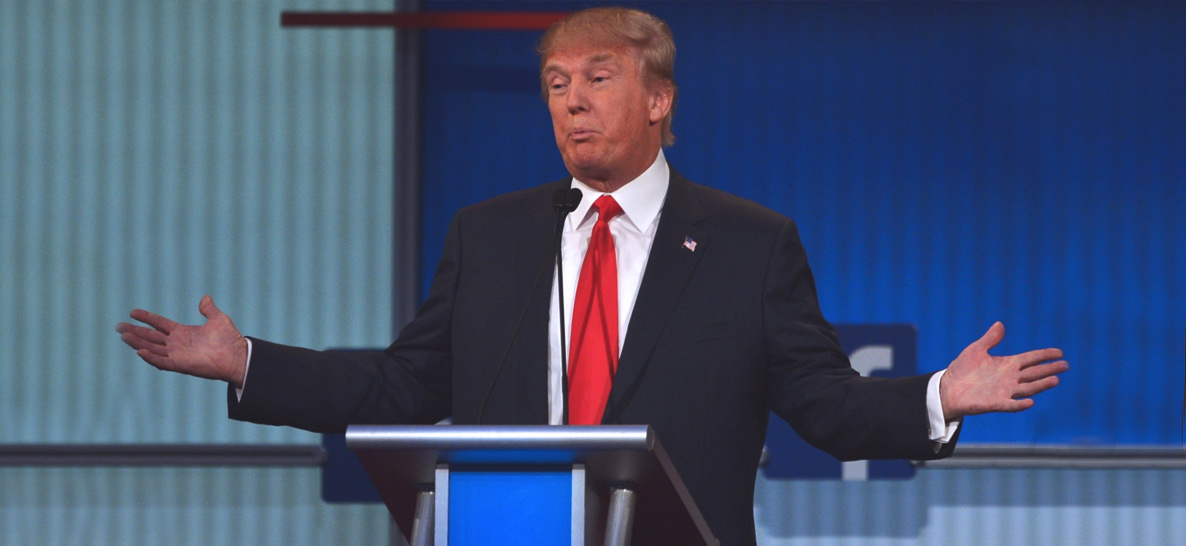
[Editor’s note: To participate in our weekly advice column, submit your questions here and watch this space each Wednesday.]
I’ve been watching the news and debates for the upcoming presidential election, and although I think he’s completely ridiculous, I kind of want to vote for Donald Trump just for entertainment value. Is that bad?
– Irresponsible Voter?
Voter,
I’ll admit, I laughed when I read your question. I completely understand where you’re coming from, and there have been moments during this election cycle where my friends have said the same thing.
Trump’s absurd soundbites and strange interviews have made for some of the most delicious political satire in years. As John Stewart has said, “Any time I feel like the world’s getting me down or boring me, and there’s nothing to look forward to, I just give myself a little slice of [Trump’s] kickoff speech.” But I think that, in order to answer your question, we’ll need to look a little deeper at the reason that Trump’s a political contender.
How Could Trump be Leading in the Polls?
The Donald’s run is about American skepticism with the political process. Ask any Trump supporter why they’d consider putting Trump in charge of the free world, and they’ll say many of the same things: he’s an outsider, he’s a straight shooter, he’s not corrupted by the political process.
It doesn’t matter that his goal to “make America great again” doesn’t come with a single clearly articulated plan, or that he doesn’t have a history of consistent political views. Interest in Trump’s platform is built entirely on public anger that America isn’t the country it once was—and the attraction to someone who’s willing to give voice to their frustration.
This cynicism isn’t specific to Boomers and Gen-Xers, millennials are disillusioned with Washington, too. In a 2014 Harvard University’s Institute of Politics poll of 18- to 29-year-olds, it became obvious that there was a growing distrust of American government institutions. At the time of the poll, less than a quarter of the millennials polled said they’d even vote in midterm elections.
One has to wonder if opting out of the process is any worse than voting for a belligerent pundit out of resentment or a sense of irony.
Does God Care About Our Rulers?
Ultimately, we all need to discern God’s views of the political process and bring our cynicism in line. Does God care about civics? Does it matter how—or if—we vote?
When Isaiah tells us that the nations of the earth are but dust on the scales (Isaiah 40:15), he communicates something profound about nationalism. We can’t put our hope in our nation or its special place in God’s economy.
If God cares about politics, it isn’t because we’re special. God does care about politics, because He cares about people.
The world’s rulers make decisions which literally affect everyone. This is why Paul tells Timothy, “I urge that supplications, prayers, intercessions, and thanksgivings be made for all people, for kings and all who are in high positions, that we may lead a peaceful and quiet life, godly and dignified in every way” (1 Timothy 2:1–2).
Let’s be honest, can we seriously commit to praying for a candidate who we voted in as a joke?
Obviously, Paul thinks the peace and dignity shared by the citizens of any country can lie in the decisions made by its rulers. And when your nation is the size of America, these choices can influence the dignity of people all over the globe.
Paul’s encouragement to Timothy to pray for his nation’s leaders came at a time when no one had any control over who was in power. What do you think Paul would have said if Timothy could actually make decisions that would influence the outcome of an election?
When we think about the influence our rulers have, we need to run potential candidates through a gridwork of questions such as:
– Does this person have a firm grasp on foreign policy?
– Does this person display a history of integrity and leadership?
– Does this person demonstrate concern for individuals from the entire spectrum of American life?
– Will this person elevate people over money?
– Will this person inspire respect from others?
If you can’t answer yes to questions like these, you shouldn’t be voting for this individual—even if their presidency would guarantee Saturday Night Live greatness for at least four years.
Getting More Involved?
In a culture where lobbyists and media conglomerates seem to have more influence over politics than the common person, it’s easy to become skeptical. But instead of seeing that cynicism as an emotion to indulge, maybe we can use it as a catalyst to get more involved.
When you find yourself becoming pessimistic about the political process, try these steps:
1. Familiarize yourself with important issues and figure out where you stand, and then prioritize those issues in importance. Once you know where you stand on your most important issues, it’s much easier to wade through candidates, positions and legislation.
2. Contribute time and money to candidates who align with your convictions. When you begin to get more involved by canvassing neighborhoods, posting signs and asking for donations, you’ll find yourself more interested with the entire process.
3. Get more involved in local politics. Many people find more meaning in city councils and voting for school boards than they do for national elections, but they all say local politics make them more passionate about politics in general.
In the end, the decisions our representatives make will affect the justice and peace enjoyed by millions. Democracy doesn’t work when those with the deepest pockets take politics more seriously than average people do.
So if you have given it some thought and you truly believe you could be proud of President Donald Trump, then by all means, vote for him. But if not, you owe it to all of us all to find a better nominee.
Have a question? Good! Send an email to [email protected]. All identifying information will be kept anonymous.























